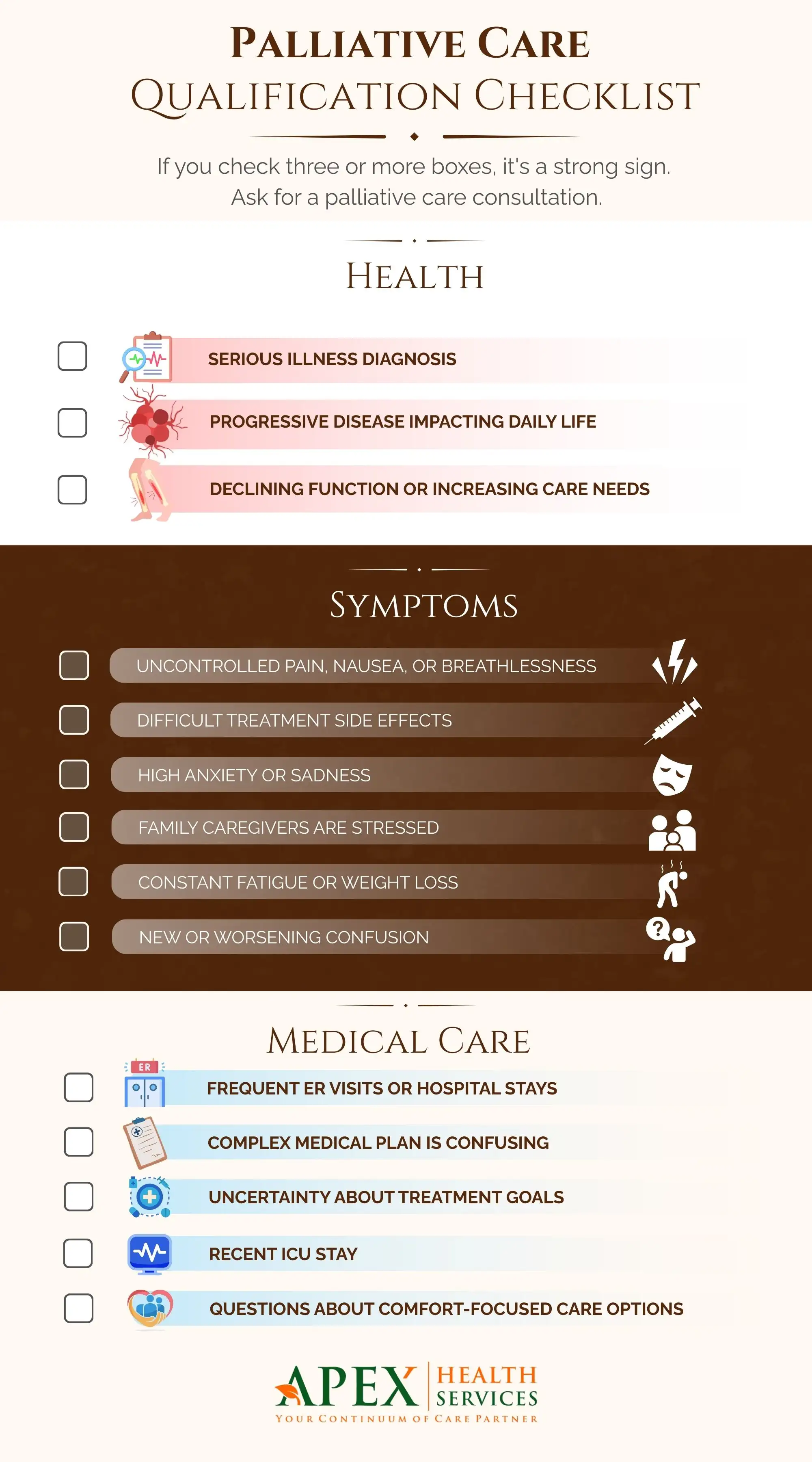Serious illness brings uncertainty, pain, and overwhelming questions about what comes next. Many families avoid palliative care because they mistakenly believe it's only for end-of-life situations, but that's not true.
Palliative care works alongside your current treatments at any stage of serious illness. While hospice focuses on end-of-life comfort, palliative care helps manage symptoms and improve daily functioning while you continue pursuing recovery.
APEX Health Services provides compassionate palliative care at home in Chicago, working closely with your health care providers to restore comfort and improve quality of life during your most challenging moments. One of the most common questions families ask is about eligibility — which conditions and circumstances qualify patients for these specialized services? We’ve outlined everything you need to know.
What Is Palliative Care? Basic Qualifications Explained.
Palliative care is a type of specialized medical care designed to bring relief when you need it most. Unlike hospice care, which focuses on end-of-life care, palliative care can start alongside curative treatment at any stage of serious illness.
The palliative care team becomes your advocate, addressing physical pain, emotional distress, and spiritual concerns. This comprehensive approach helps patients manage debilitating symptoms while continuing other medical treatments that offer hope for recovery.
Medical Conditions That Qualify Patients for Palliative Care

The good news is that many serious illnesses benefit from palliative care services, regardless of prognosis or life expectancy. Patients with life-threatening illnesses often experience dramatically better outcomes when palliative care begins early in their treatment journey.
- Heart disease: Causing chest pain, shortness of breath, and exhaustion that limit daily activities.
- Chronic kidney disease: With nausea, fatigue, and fluid retention impacting quality of life.
- Chronic lung disease: Creating breathing difficulties, persistent cough, and reduced mobility.
- Neurological conditions: Including amyotrophic lateral sclerosis (ALS) and other progressive conditions causing muscle weakness.
- Cancer: Managing pain, fatigue, nausea, and other side effects from chemotherapy and treatment.
- Chronic obstructive pulmonary disease (COPD): Requiring ongoing home oxygen use and creating breathing difficulties with frequent hospitalizations.
- Advanced liver disease: Requiring specialized symptom management and comfort care.
- Multiple sclerosis: With symptoms that interfere with daily functioning.
- Progressive illnesses: Where symptom relief and quality of life are immediate priorities alongside treatment.
The palliative care organization works closely with health care providers to determine the ideal timing for patients to start these life-improving services.
How to Know Whether Palliative Care Is Right
At APEX, we understand that knowing when to begin palliative care can feel overwhelming, but certain signs indicate it's time to explore these services. The palliative care team can help evaluate whether this approach aligns with your current health situation and treatment goals. Common signs include:

- Persistent pain that interferes with sleep, appetite, or daily activities despite medical treatments.
- Frequent emergency room visits for symptom management or complications from chronic disease.
- Side effects from medical treatments that significantly impact your ability to function normally.
- Difficulty managing multiple medications or confusion about treatment plans and options.
- Distressing physical or psychological symptoms resulting from a progressive disease.
- Family members struggling to provide adequate support or cope with caregiving demands.
- Questions about treatment goals and whether current therapies align with your values and wishes.
- The decision to receive palliative care is daunting, but it’s a proactive step toward better symptom control and improved daily functioning.
Life-Changing Benefits of Palliative Care
Palliative care brings meaningful improvements to daily life by addressing what matters most: your comfort, independence, and personal values throughout your health journey.
Consistent Pain Management
Professional palliative care specialists create personalized strategies to control pain and symptoms, allowing you to maintain better quality of life and independence during treatment.
Effective Self-Management at Home
The care team teaches you and your family practical techniques for managing symptoms between visits, empowering you to stay comfortable in your own home.
Guidance in Advanced Care Planning
Palliative care specialists help you clarify your treatment goals and communicate your preferences, ensuring your values and wishes lead the way in all medical decisions.
Strong Support Network
Social workers and spiritual counselors address the emotional toll of serious illness, helping patients and families cope with fear, anxiety, and grief.
How to Get Palliative Care Services

Getting started with palliative care involves several straightforward steps; however, please note that the process may vary depending on your current health care providers and insurance coverage.
1. Talk with Your Primary Doctor
Start by discussing palliative care options with your current health care provider, who can provide referrals and help coordinate services.
2. Contact Palliative Care Providers Directly
Many palliative care services accept direct referrals from patients and families, making it possible to begin services quickly.
3. Verify Insurance Coverage
Check with your insurance provider to learn about coverage for palliative care services and any pre-authorization requirements.
4. Coordinate with the Existing Care Team
Your palliative care specialist will work with other doctors and health care providers to ensure the services are integrated seamlessly.
5. Schedule an Initial Assessment
The palliative care team will conduct a comprehensive evaluation to develop a personalized care plan addressing your specific needs.
Where to Get Palliative Care in Chicago

Palliative care services are available in multiple settings throughout Chicago and the surrounding suburbs, allowing patients to receive care where they feel most comfortable and supported. The location often depends on your specific medical needs, family situation, and personal preferences.
- Home-based services: With visiting palliative care specialists, nurses, and support staff providing personalized attention.
- Hospital settings: Where palliative care teams work alongside other specialists during admission.
- Outpatient clinic visits: For regular appointments and ongoing symptom management sessions.
- Assisted living coordination: Where staff coordinate with palliative care providers for resident care.
- Nursing home partnerships: Where specialized teams provide additional comfort measures and support.
- Hospice program integration: When curative treatment is no longer the primary goal.
Palliative care is flexible, allowing patients to receive services in the environment where they feel safest and most supported by loved ones.
When to Choose Palliative Care at Home
Many families wonder whether home-based palliative care is the right choice for their loved one. In reality, receiving palliative care services in your own home often provides the most comfort and allows patients to maintain familiar routines.
Home palliative care works particularly well when patients prefer staying in their own environment and need regular symptom management without frequent hospital visits. The care team is there to provide medication management, pain relief, and emotional support while you focus on staying close to loved ones.
This approach reduces travel stress and creates opportunities for personalized attention from your palliative care specialist.
FAQ
Take the Next Step Toward Better Care
Living with a serious illness doesn't mean you have to accept unnecessary suffering or compromise your quality of life. Palliative care offers hope, comfort, and practical solutions when you need them most.
At APEX Health Services, we mean it when we say we treat your loved ones how we treat our own family. Our compassionate team is ready to bring tailored palliative care directly to your home, working with your insurance and existing medical team to create a personalized plan that prioritizes your comfort and well-being. Contact us today to learn how our palliative care specialists can help you live better while managing serious illness.

.svg)
.webp)


